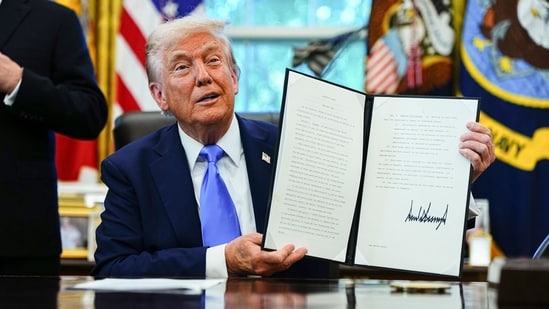H-1B Visa Fee Hike: On September 20th, US President Donald Trump announced a multifold increase in H-1B visa fees to $100,000. However, this decision is not expected to have a significant impact on India’s IT sector. This is because Indian IT companies have been steadily reducing their dependence on H-1B visas for some time.
H-1B Visa Fee Hike: On September 20th, US President Donald Trump announced a multifold increase in H-1B visa fees to $100,000. However, this decision is not expected to have a significant impact on India’s IT sector. This is because Indian IT companies have been steadily reducing their reliance on H-1B visas for some time and are prioritizing local hiring in the US market.
Companies like Tata Consultancy Services (TCS), Infosys, HCLTech, Wipro and Tech Mahindra now rely on H-1B visas to deploy employees in North America, ranging from 20 per cent to 50 per cent.
H-1B visas allow US-based companies to hire foreign workers in sectors such as STEM and IT. However, the number of H-1B applications approved for India’s top seven IT companies declined by 56 percent between 2015 and 2023, to 6,700. Companies like Infosys and TCS now hire more than 50% of their employees locally in the US, reducing their reliance on visas.
strategy of companies
TCS generates nearly half of its revenue from North America and currently hires more than 50 percent of its US employees locally. TCS CEO K. Krithivasan told Moneycontrol in January this year that on average, they receive 3,000 to 4,000 H-1B visas every year. “This is a small number overall. If there is a decrease in the availability of H-1B visas, we can compensate for it by hiring locally or shifting work to India,” he said.
Similarly, Infosys has made more than 60% of its US workforce local. CFO Jayesh Sangarajka stated that the proportion of its on-site H-1B employees will decline to 24% in fiscal 2025, from around 30% previously.
HCL Tech and Wipro have the lowest dependence on H-1Bs. Both companies employ approximately 80% of their US workforce locally. According to HCL Tech’s Chief People Officer, Ramachandran Sundararajan, the company uses a maximum of 500 to 1,000 H-1B visas each year. Wipro CEO Srinivas Palliya said in January that the company has sufficient H-1B reserves and can meet US demand if needed.
Tech Mahindra faces a similar situation. Only 30% of its US workforce is on H-1B visas. CEO Mohit Joshi explained that the company has built a large local team and developed nearby delivery centers, reducing its reliance on H-1B visas to below 30%.
Demand for H-1B visas
Indian IT companies may have reduced their reliance on H-1B visas, but demand for them remains strong. According to data from the US immigration agency, USCIS, the number of H-1B visa applications increased by 3.1 percent in 2024. The number of approved applications increased by 4 percent, while the rejection rate declined by 32.5 percent. The approval rate rose to 98.4 percent, the highest level since 2021.
Kamal Karanth, co-founder of staffing firm Xpheno, says that growing demand in areas like digital transformation, artificial intelligence, cloud computing, and cybersecurity, along with the shortage of STEM skills in the US, has kept the demand for H-1B visas strong. Krishna Vij, business head at TeamLease Digital, also believes that ongoing global trends in the IT sector will further fuel this demand.
We have taken all measures to ensure that the information provided in this article and on our social media platform is credible, verified and sourced from other Big media Houses. For any feedback or complaint, reach out to us at businessleaguein@gmail.com






